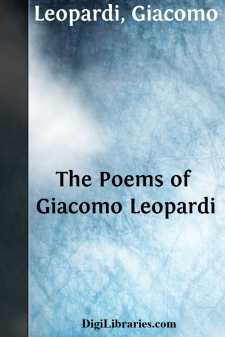Categories
- Antiques & Collectibles 13
- Architecture 36
- Art 48
- Bibles 22
- Biography & Autobiography 813
- Body, Mind & Spirit 142
- Business & Economics 28
- Children's Books 14
- Children's Fiction 11
- Computers 4
- Cooking 94
- Crafts & Hobbies 4
- Drama 346
- Education 46
- Family & Relationships 57
- Fiction 11829
- Games 19
- Gardening 17
- Health & Fitness 34
- History 1377
- House & Home 1
- Humor 147
- Juvenile Fiction 1873
- Juvenile Nonfiction 202
- Language Arts & Disciplines 88
- Law 16
- Literary Collections 686
- Literary Criticism 179
- Mathematics 13
- Medical 41
- Music 40
- Nature 179
- Non-Classifiable 1768
- Performing Arts 7
- Periodicals 1453
- Philosophy 64
- Photography 2
- Poetry 896
- Political Science 203
- Psychology 42
- Reference 154
- Religion 513
- Science 126
- Self-Help 84
- Social Science 81
- Sports & Recreation 34
- Study Aids 3
- Technology & Engineering 59
- Transportation 23
- Travel 463
- True Crime 29
The Poems of Giacomo Leopardi
by: Giacomo Leopardi
Description:
Excerpt
PREFACE.
Giacomo Leopardi is a great name in Italy among philosophers and poets, but is quite unknown in this country, and Mr. Townsend has the honor of introducing him, in the most captivating way, to his countrymen. In Germany and France he has excited attention. Translations have been made of his works; essays have been written on his ideas. But in England his name is all but unheard of. Six or seven years ago Mr. Charles Edwards published a translation of the essays and dialogues, but no version of the poems has appeared, so far as I know. Leopardi was substantially a poet,—that is to say, he had imagination, sentiment, passion, an intense love of beauty, a powerful impulse towards things ideal. The sad tone of his speculations about the universe and human destiny gave an impression of mournfulness to his lines, but this rather deepened the pathos of his work. In the same breath he sang of love and the grave, and the love was the more eager for its brevity. He had the poetic temperament—sensitive, ardent, aspiring. He possessed the poetic aspect—the broad white brow, the large blue eyes. Some compared him to Byron, but the resemblance was external merely. In ideas, purpose, feeling, he was entirely unlike the Englishman; in the energy and fire of his style only did he somewhat resemble him. Worshippers have even ventured to class him with Dante, a comparison which shows, at least, in what estimation the poet could be held at home, and how largely the patriotic sentiment entered into the conception of poetical compositions, how necessary it was that the singer should be a bard. His verses ranged over a large field. They were philosophic, patriotic, amorous. There are odes, lyrics, satires, songs; many very beautiful and feeling; all noble and earnest. His three poems, “All' Italia,” “Sopra il Monumento di Dante,” “A Angelo Mai,” gave him a national reputation. They touch the chords to which he always responded—patriotism, poetry, learning, a national idealism bearing aloft an enormous weight of erudition and thought.
Leopardi was born at Recanati, a small town about fifteen miles from Ancona, in 1798. He was of noble parentage, though not rich. His early disposition was joyous, but with the feverish joy of a highly-strung, nervous organization. He was a great student from boyhood; and severe application undermined a system that was never robust, and that soon became hopelessly diseased. Illness, accompanied with sharp pain, clipped the wings of his ambition, obliged him to forego preferment, and deepened the hopelessness that hung over his expectations. His hunger for love could not be satisfied, for his physical infirmity rendered a union undesirable, even if possible, while a craving ideality soon transcended any visible object of affection. He had warm friends of his own sex, one of whom, Antonio Ranieri, stayed by him in all vicissitudes, took him to Naples, and closed his eyes, June 14, 1837.
To this acute sensibility of frame must be added the torture of the heart arising from a difference with his father, who, as a Catholic, was disturbed by the skeptical tendencies of his son, and the perpetual irritation of a conflict with the large majority of even philosophical minds. An early death might have been anticipated. No amount of hopefulness, of zest for life, of thirst for opportunity, of genius for intellectual productiveness will counteract such predisposition to decay. The death of the body, however, has but ensured a speedier immortality of the soul; for many a thinker has since been busy in gathering up the fragments of his mind and keeping his memory fresh. His immense learning has been forgotten. His archæological knowledge, which fascinated Niebuhr, is of small account to-day. But his speculative and poetical genius is a permanent illumination.
Mr. Townsend, the translator, well known in New York, where he was born, lived ten years in Italy, and seven in Rome....


